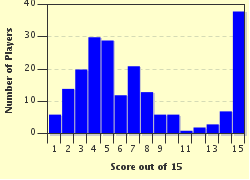Quiz Answer Key and Fun Facts
1. Which vast novel opens with these memories of childhood?
"For a long time I would go to bed early. Sometimes, the candle barely out, my eyes closed so quickly that I did not have time to tell myself: "I'm falling asleep.""
2. The author of this Russian classic burnt the first draft. He never felt it finished, and it was published after his death. It starts with the following lines. Which book is it?
"One hot spring evening, just as the sun was going down, two men appeared at Patriarch's Ponds."
3. Which English author began her first published 1847 novel with these lines?
"There was no possibility of taking a walk that day. We had been wandering, indeed, in the leafless shrubbery an hour in the morning but since dinner (Mrs Reed, when there was no company, dined early) the cold winter wind had brought with it clouds so somber, and a rain so penetrating, that further outdoor exercise was now out of the question."
4. Which short French novel gets off to a start with these rather dour words?
"Mother died today. Or maybe yesterday. I don't know. I had a telegram from the home. "Mother passed away. Funeral tomorrow. Yours sincerely." That doesn't mean anything. It may have been yesterday."
5. Which novel by a 1920 Nobel Prize-winning author begins in the following way?
"The long, long road over the moors and up into the forest - who trod it into being first of all? Man, a human being, the first that came here. There was no path before he came. Afterward, some beast or other, following the faint tracks over marsh and moorland, wearing them deeper."
6. Which Irish writer began his 1938 novel with the following sentence?
"The sun shone, having no alternative, on the nothing new."
7. Which French-language novel, first published in 1936, begins with these lines?
"Here we are, alone again. It's all so slow, so heavy, so sad... I'll be old soon. Then it will be over. So many people have come into my room. They've talked. They haven't said much. They've gone away. They've grown old, wretched , sluggish, each in some corner of the world."
8. Which 1917 short novel, that takes the form of a confession, starts with these words?
"Only the young have such moments. I don't mean the very young. No. The very young have, properly speaking, no moments. It is the privilege of early youth to live in advance of its days in all the beautiful continuity of hope which knows no pauses and no introspection."
9. Which farcical novel, published in two parts separated by a ten-year gap, starts off like this?
"Idle reader: I don't have to swear to any oaths to persuade you that I should like this book, since it is the son of my brain, to be the most beautiful, elegant and intelligent book imaginable. But I couldn't go against the order of nature, according to which like gives birth to like."
10. Which 1932 book, that was made into a film in 1969, starts off with the following words?
"Once upon a time there lived in Berlin, Germany, a man called Albinus. He was rich, respectable, happy; one day he abandoned his wife for the sake of a youthful mistress; he loved; was not loved; and his life ended in disaster"
11. Which mammoth novel, the last part of which was published posthumously, begins in the following way?
"A barometric low hung over the Atlantic. It moved eastward toward a high-pressure area over Russia without as yet showing any inclination to bypass this high in a northerly direction."
12. Which literary apex, described by Dostoyevsky as "flawless", starts in the following way?
"All happy families resemble one another, but each unhappy family is unhappy in its own way."
13. Which 1957 nouveau roman begins with the following, very prosaic, words?
"Now the shadow of the column - the column which supports the south-west corner of the roof - divides the corresponding corner of the veranda into two equal parts."
14. Which Anglo-Irish novelist began his late 18th century novel in the following way?
"I wish either my father or my mother, or indeed both of them, as they were in duty both equally bound to it, had minded what they were about when they begot me."
15. Which author's 1856 debut, which was to become one of the most influential novels of all time, begins in the following way?
"We were in the preparation room when the head came in, followed by a new boy in ordinary day clothes, and by a school servant carrying a large desk. Those of us who were asleep woke up, and we all rose to our feet doing our best to give the impression that we had been interrupted in the midst of our labours."
Source: Author
thula2
This quiz was reviewed by FunTrivia editor
looney_tunes before going online.
Any errors found in FunTrivia content are routinely corrected through our feedback system.

